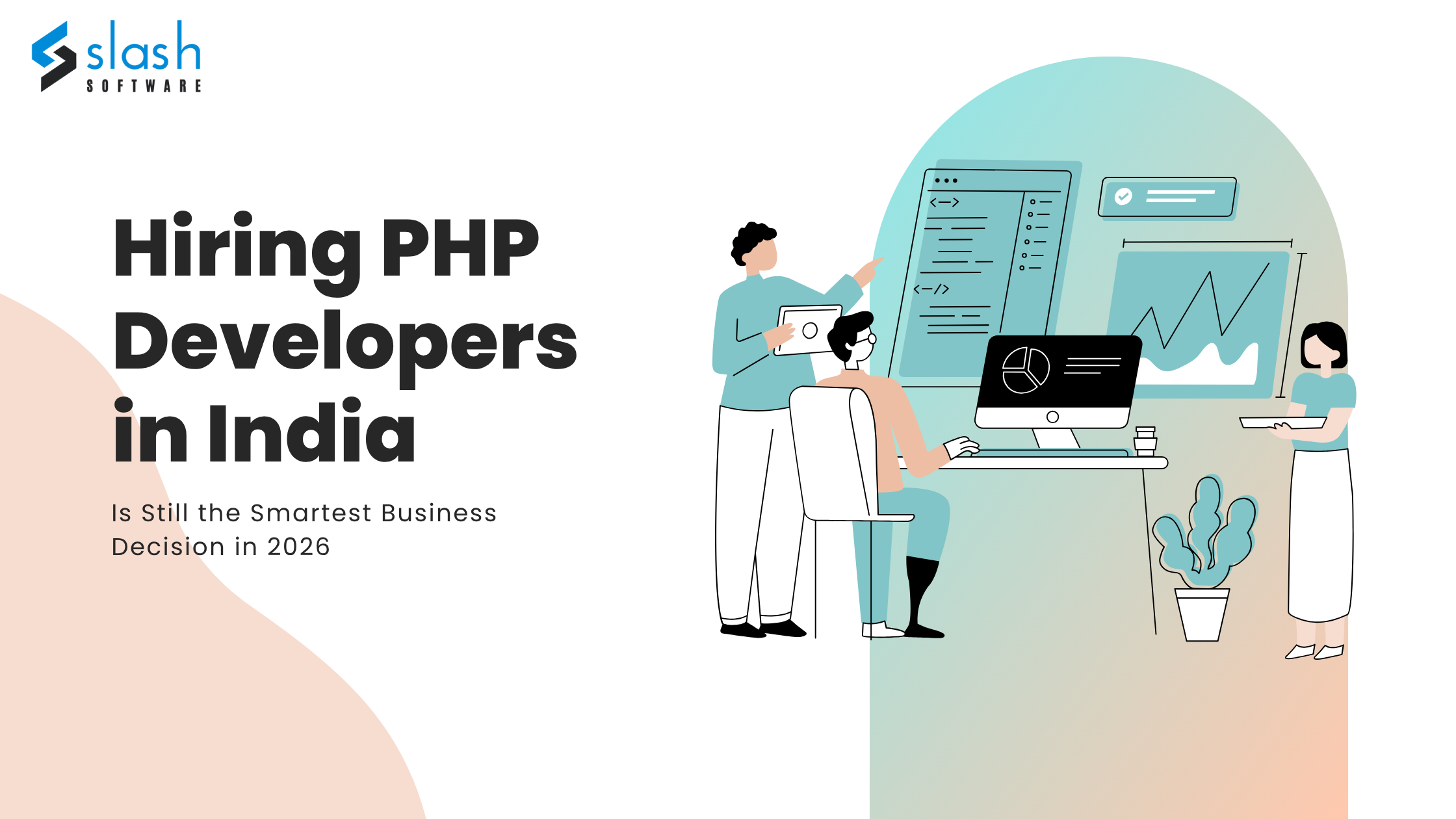Technology moves fast, but business fundamentals don’t. You still want reliability, speed, cost control, and access to skilled people who can turn ideas into stable systems. PHP has quietly powered that equation for two decades and India has quietly supplied the talent.
Let’s unpack why this remains true in 2026 and what you need to know before signing your first contract or retainer.
The Real State of PHP in 2026
Forget the noise that “PHP is dying.” Numbers tell a different story: about 73% of websites using a server-side language still run on PHP. WordPress alone powers roughly 43% of all sites. That means maintenance, upgrades, new plugins, migrations, and API integrations create steady, profitable work.
Modern PHP (versions 8.1–8.3) is not the same language you remember from 2010. It supports strong typing, async features, and frameworks like Laravel, Symfony, and CodeIgniter that deliver elegant architecture and scalable performance.
In short: PHP’s staying power ensures your product won’t be trapped in an obsolete tech stack, and the global talent pool to support it is massive.
Why India Is Still the Global Epicenter for PHP Talent
1. A Giant Pool of Skilled Developers
India produces more than a million engineering graduates annually. Out of this pool, an estimated 400,000+ developers have active PHP experience. This isn’t a niche market; it’s a mature ecosystem with specialists in Laravel, WordPress, and e-commerce systems like Magento and WooCommerce.
2. Experience That Matches Western Standards
Top Indian development companies now operate on ISO, CMMI, and SOC standards. Teams use Git workflows, CI/CD pipelines, automated testing, and agile sprints just like their counterparts in Silicon Valley.
You’re not buying “cheap labor”—you’re partnering with engineers trained in the same tools and patterns you already use internally.
3. Economic Efficiency That Scales
Let’s talk numbers:
- Average hourly rate for PHP developers in India: $20–$40/hour for experienced professionals.
- Average in the US or Western Europe: $80–$150/hour.
That’s up to a 60–70% cost advantage without compromising quality.
Lower operational costs don’t mean low quality. It simply reflects lower living costs and a strong supply of skilled professionals.
4. Time Zone Advantage
For Europe, the overlap is 4–6 hours. For the US, teams can shift to early or late hours to provide 2–3 hours of live collaboration. Many Indian companies now run 24/7 hybrid models to ensure support and round-the-clock development cycles.
5. English Fluency and Global Culture
English is a primary business language in India. Developers and project managers communicate fluently, reducing misinterpretations and documentation errors.
The Real Questions to Ask Before You Hire
If you’re serious about hiring PHP developers in India, you should be thinking beyond price. Here’s what to evaluate before signing that deal.
1. Technical Depth
Ask for specifics:
- Which PHP version are they using? (It should be 8.1 or higher.)
- What frameworks do they specialize in—Laravel, Symfony, CodeIgniter?
- How do they manage dependencies (Composer, versioning)?
- What’s their testing framework—PHPUnit or Pest?
- Do they perform static analysis (PHPStan or Larastan)?
The right team will answer confidently and show you a working CI/CD setup.
2. Architecture & Scalability
A strong PHP developer should discuss database optimization, caching, background jobs, and queue management using Redis or SQS. Ask them how they prevent N+1 query issues or handle 10,000 concurrent users. Their ability to talk metrics and performance tells you everything about their seniority.
3. Code Ownership & IP Rights
Make sure your contract clearly states:
- You own the source code, IP, and all assets.
- Code is stored in your Git repository.
- Deliverables are versioned and documented.
This protects you from vendor lock-in.
4. Security & Compliance
India now operates under the Digital Personal Data Protection (DPDP) Act, 2023, which aligns with global data-privacy expectations. Reputable Indian firms also comply with GDPR and OWASP best practices.
Ensure your contract includes data-handling clauses, encryption requirements, and 72-hour breach notification obligations.
5. Delivery Process
Avoid black-box outsourcing.
Your vendor should use transparent processes:
- Agile sprints or Kanban boards for tracking.
- Weekly demos or sprint reviews.
- Real-time project visibility in Jira, Trello, or ClickUp.
- Automated builds and test coverage reports.
When a company shows you working pipelines and clean documentation, you’re looking at professionals—not freelancers guessing their way through.
| Metric | Good Sign | Red Flag |
| Deployment Frequency | Weekly or faster | Monthly or ad-hoc |
| Test Coverage | 70%+ with PHPUnit/Pest | Manual testing only |
| Lead Time (commit→deploy) | < 1 week | >3 weeks |
| Change Failure Rate | < 10% | Frequent rollbacks |
| MTTR (Mean Time to Recovery) | < 1 day | Multiple days downtime |
| Response Time on Queries | < 12 hrs | Delayed / inconsistent |
These KPIs tell you whether your offshore team is truly performing, regardless of distance or culture.
Common Pitfalls (and How to Avoid Them)
Pitfall 1: Picking the Cheapest Quote
The cheapest team often hides missing skills, poor testing, or lack of long-term support. Always balance cost with evidence of engineering discipline.
Pitfall 2: Ignoring Upgrade Cycles
Every PHP version has an end-of-life (EOL). If your vendor isn’t scheduling migrations every two years, you’ll end up with security holes and deprecated functions.
Pitfall 3: Poor Communication Habits
A successful offshore relationship depends on cadence—standups, weekly demos, documented changes. Make those rituals contractual, not optional.
Pitfall 4: Undefined Maintenance
Once your project launches, maintenance is where most failures happen. Plan it upfront: include monthly retainer, patch management, and incident response in your budget.
How to Structure Your Engagement
- Start with a Pilot Project – 4–6 weeks. One feature or module. Evaluate code quality, responsiveness, and documentation.
- Scale to Dedicated Team – Once you’re confident, expand into a long-term contract.
- Define Exit Clauses – Protect yourself. Own your repos, credentials, and hosting accounts.
- Implement Joint Reviews – Monthly technical audits with both sides present.
This gives you the control of in-house development with the flexibility of offshore resources.
The Long-Term View: Why This Still Works in 2026
While AI-assisted development, no-code tools, and automation keep evolving, PHP and human developers remain essential for custom systems, API integrations, and large enterprise logic.
India continues to invest heavily in AI, cloud, and cybersecurity training—so your PHP hires are not static coders; they’re evolving engineers. Combined with stable pricing, mature process, and global delivery experience, India stays unbeatable for backend development in the near future.
Why Choose Slash Software to Hire PHP Developers in India
If you’re convinced that hiring PHP developers from India is the smart move, the next question is which partner? That’s where Slash Software comes in.
Here’s why global businesses choose Slash Software :
- Deep PHP & Laravel Expertise – Robust web applications, APIs, and enterprise portals designed for performance.
- End-to-End Services – Architecture, development, QA, DevOps, and post-launch maintenance all under one roof.
- Global Delivery Experience – 500+ projects across healthcare, fintech, logistics, and SaaS.
- Agile and Transparent Process – Weekly demos, code reviews, CI/CD, and complete visibility.
- Security & Compliance First – Alignment with OWASP, GDPR, and India’s DPDP Act.
- Flexible Engagement Models – Dedicated teams, fixed-price projects, or staff augmentation.
- Long-Term Partnership Focus – We build relationships, not one-off deliveries.
When you Hire PHP Developers from Slash Software, you get more than manpower—you get a strategic technology partner that aligns code with your business goals.
Conclusion
Hiring PHP developers in India in 2026 isn’t just about saving money—it’s about building smarter. It’s about leveraging a deep, disciplined talent market to deliver faster, safer, and more scalable digital products.
India’s ecosystem now blends technical maturity, data-protection compliance, communication fluency, and cost efficiency like no other region. The key is picking a partner who proves their craft, documents their process, and delivers transparency.
If that’s what you’re looking for, Slash Software is ready to help you build what’s nextsecurely, efficiently, and brilliantly.


